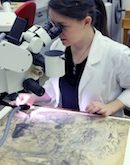Course Information
| Session |
|---|
| Credits | 1.5 CEUs or 15 PDHs |
|---|---|
| Registration dates | We accept registrations through the first week of classes, unless enrollment is full, and unless the class was canceled before it started due to low enrollment. |
$250.00
Dates: October 6 - November 2Credits: 1.5 CEUs or 15 PDHs
Collections care is central to the work of any library, museum, or archive, but it is not always easy for collection managers to determine how to provide the best care in less-than-ideal circumstances. Compromises often need to be made, which might include storing items in rooms subject to seasonal temperature and humidity fluctuations, or allowing researchers to handle highly fragile materials. The American Institute for Conservation of Historic and Artistic Works describes these compromises as “the systematic mitigation of all risks to all strategically managed values of a collection.” This means, essentially, that best practices are weighed against financial costs, the availability of resources, the desired use of collections, and the probable long-term effects of their choices to determine the best working solution with the least risk. The primary responsibility for a collections care professional is to make sure that these compromises are the result of careful assessment and decision-making, and are not allowed to happen merely through inaction or neglect.
This course is designed for librarians, archivists and other professionals working with physical archival collections who are looking to expand their expertise in the field of preservation. This course will provide an introduction to foundational preventive conservation concepts and strategies. The assignments are designed to help you establish basic policy and procedure and build a custom preservation model for your individual institution. Environmental controls, rehousing procedures, storage standards and disaster planning are all topics that will be discussed. Some experience in the cultural heritage sector is helpful though not essential. Additionally, if you are not currently working in an institutional setting, modifications to the assignments are available.
Course goals:
| Session |
|---|
| Credits | 1.5 CEUs or 15 PDHs |
|---|---|
| Registration dates | We accept registrations through the first week of classes, unless enrollment is full, and unless the class was canceled before it started due to low enrollment. |
Collections care is central to the work of any library, museum, or archive, but it is not always easy for collection managers to determine how to provide the best care in less-than-ideal circumstances. Compromises often need to be made, which might include storing items in rooms subject to seasonal temperature and humidity fluctuations, or allowing researchers to handle highly fragile materials. The American Institute for Conservation of Historic and Artistic Works describes these compromises as “the systematic mitigation of all risks to all strategically managed values of a collection.” This means, essentially, that best practices are weighed against financial costs, the availability of resources, the desired use of collections, and the probable long-term effects of their choices to determine the best working solution with the least risk. The primary responsibility for a collections care professional is to make sure that these compromises are the result of careful assessment and decision-making, and are not allowed to happen merely through inaction or neglect.
This course is designed for librarians, archivists and other professionals working with physical archival collections who are looking to expand their expertise in the field of preservation. This course will provide an introduction to foundational preventive conservation concepts and strategies. The assignments are designed to help you establish basic policy and procedure and build a custom preservation model for your individual institution. Environmental controls, rehousing procedures, storage standards and disaster planning are all topics that will be discussed. Some experience in the cultural heritage sector is helpful though not essential. Additionally, if you are not currently working in an institutional setting, modifications to the assignments are available.
Course goals:
 Lauren Buttle is the Paper Conservator for the Royal British Columbia Museum and Archives in Victoria, BC. Lauren holds a Bachelor of Arts in Art History and Social Anthropology from York University and a Masters of Art Conservation from Queen’s University. Prior to joining the Royal BC Museum, Lauren held the Kress Fellowship in Papyrus Conservation at the Library for Trinity College Dublin. She has also worked and trained at several museums and archives in Canada as well as the British Museum.
Lauren Buttle is the Paper Conservator for the Royal British Columbia Museum and Archives in Victoria, BC. Lauren holds a Bachelor of Arts in Art History and Social Anthropology from York University and a Masters of Art Conservation from Queen’s University. Prior to joining the Royal BC Museum, Lauren held the Kress Fellowship in Papyrus Conservation at the Library for Trinity College Dublin. She has also worked and trained at several museums and archives in Canada as well as the British Museum.
Reviews
There are no reviews yet.